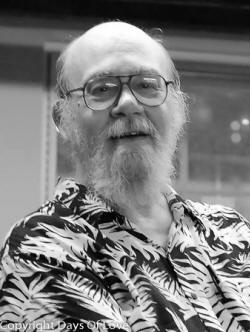

Partner Charles Naylor, Jr, buried together
Queer Places:
Cooper Union, 30 Cooper Sq, New York, NY 10003, Stati Uniti
New York University, New York, 10003, Stati Uniti
St John, 1458 W Locust St, Dubuque, IA 52001, Stati Uniti
 Thomas
Michael Disch (February 2, 1940 – July 4, 2008) was an American science
fiction author and poet.[1][2][3]
He won the Hugo Award for Best Related Book – previously called "Best
Non-Fiction Book" – in 1999, and he had two other Hugo nominations and
nine Nebula Award nominations to his credit, plus one win of the John W.
Campbell Memorial Award, a Rhysling Award, and two Seiun Awards, among
others.
Thomas
Michael Disch (February 2, 1940 – July 4, 2008) was an American science
fiction author and poet.[1][2][3]
He won the Hugo Award for Best Related Book – previously called "Best
Non-Fiction Book" – in 1999, and he had two other Hugo nominations and
nine Nebula Award nominations to his credit, plus one win of the John W.
Campbell Memorial Award, a Rhysling Award, and two Seiun Awards, among
others.
In the 1960s, his work began appearing in science-fiction magazines. His critically acclaimed science fiction novels, The Genocides, Camp Concentration, 334 and On Wings of Song are major contributions to the New Wave science fiction movement. In 1996, his book The Castle of Indolence: On Poetry, Poets, and Poetasters was nominated for the National Book Critics Circle Award,[4] and in 1999, Disch won the Nonfiction Hugo for The Dreams Our Stuff Is Made Of, a meditation on the impact of science fiction on our culture, as well as the Michael Braude Award for Light Verse. Among his other nonfiction work, he wrote theatre and opera criticism for The New York Times, The Nation, and other periodicals. He also published several volumes of poetry as Tom Disch.
Following an extended period of depression following the death in 2005 of his life-partner, Charles Naylor, Disch stopped writing almost entirely, except for poetry and blog entries – although he did produce two novellas.[4] Disch killed himself by gunshot[4] on July 4,[1][2][3][4][5][6][7] 2008 in his apartment in Manhattan, New York City. Naylor and Disch are buried alongside each other at Saint Johns Episcopal Church Columbarium, Dubuque, Iowa. His last book, The Word of God, which was written shortly before Naylor died, had just been published a few days before Disch's death.[4]
He shared his Manhattan apartment and a house in Barryville, New York, with his partner of three decades, poet Charles Naylor. Although he was publicly gay after 1968 and this facet of his life was occasionally foregrounded in his work (most notably in his poetry and On Wings of Song), he did not try to write to a particular community: "I'm gay myself, but I don't write 'gay' literature."[14] He rarely mentioned his sexuality in interviews, though he was interviewed by the Canadian gay periodical The Body Politic in 1981.[17] After Naylor's death in 2005, Disch had to abandon the house, as well as fight attempts to evict him from his rent controlled apartment, and he became steadily more depressed. He wrote on a LiveJournal account from April 2006 until his death (he killed himself by gunshot), in which he posted poetry and journal entries.[18] Shortly before Disch's death, in September and October 2007 literary critic Peter Swirski conducted email interviews with Disch concerning his novels The M.D. A Horror Story and the early 334. Excerpts from these exchanges were published in Swirski's 2010 study Literature, Analytically Speaking – Chapter 7 is mostly on The M.D. – with Disch responding to questions with wit and irony.[19]

Cooper Union, 30 Cooper Sq, New York, NY 10003
Elmer Holmes Bobst Library, NYU, New York City
Disch was an outspoken atheist[20] as well as a satirist;[21] his last novel The Word of God was published by Tachyon Publications in the summer of 2008. His last published work, the posthumous story collection The Wall of America, contains material from last half of Disch's career.
My published books: